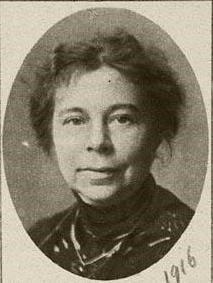Marie Elise Loke

Sunday 11 February 2024 is the 9th International Day of Women and Girls in Science. On that day, the United Nations calls attention to gender equality in science education. In the Netherlands, thoughts quickly turn to Aletta Jacobs, the first woman to successfully complete a university degree in our country. Less well-known, but no less respectable, is the history of Marie Elise Loke. She was born in Hoorn on 7 August 1870 and died in Groningen on 2 February 1916.
Loke obtained her teaching certificates mo-A and B and worked at the Stedelijk Gymnasium in Kampen and the “meisjes-hbs” in The Hague. In preparation for obtaining the mo-degree B French, she took private lessons with Dr. J. J. Salverda de Grave, a respected professor of Romance philology and French language and literature at Groningen. He enjoyed great, international prestige as a Romanist.
Loke eventually wanted a doctorate in French language and literature, but did not have the proper prior education. Salverda de Grave introduced her to the University of Toulouse, where she received her doctorate in June 1906. It is very special that she was the first Dutch person abroad to obtain a doctorate in a modern language. She was a passionate scholar, which is partly illustrated by the fact that she took unpaid leave during the doctoral term.
In October 1907, she was appointed the first female lecturer in the Netherlands. Upon the official acceptance of the professorship in the University of Groningen, Loke gave a public lecture in 1908 at De Harmonie society. With her somewhat feminist lesson about Belle van Zuylen, she showed the women present that you can work in science without compromising your femininity.
A condition attached to her position as a lecturer in the university was that no paid ancillary activities should be performed. Hence, no man had shown interest in the position. Was this perhaps why, in addition to her professorship, she became a board member of the Nederlandsche Bond voor Vrouwenkiesrecht in 1910?
Loke also served on various committees and boards and directed student theater. This resulted, among other things, in a performance of the comedy 'Les femmes savantes' (The Learned Women) by Molière. She also collaborated on the exhibition 'De Vrouw 1813-1913'. The purpose of that exhibition was to show what women had achieved, 100 years after the liberation from the French occupiers. With the exhibition, the organization also wanted to draw attention to women's suffrage. Unfortunately, we find nothing about this in Loke's archives.
In the Special Collections strong room is a small archive of Loke (UBG075). This consists of various correspondence and, among other things, Queen Wilhelmina's decision to appoint M.E. Loke as Lecturer, dated February 7, 1916.
Further reading
-
Inge de Wilde, Een beminnelijke romaniste: Marie Elise Loke (1870-1916), de eerste vrouwelijke lector in Nederland / available in the UB: 22A 517
-
Catalogue of the exhibition "De vrouw 1813-1913", "Meerhuizen"-Amsteldijk: May-October 1913, Amsterdam / available in the Special Collections reading room: IKUN I DRUPSTEEN (13CATA) 1
-
Molière, Les femmes savantes: comédie en cinq actes / available in the UB: 15A 7051

